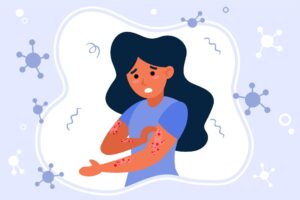Last updated on September 26th, 2024 at 11:15 am
Scabies Treatment – Scabies is a highly contagious skin infestation caused by the Sarcoptes scabies mite. These tiny mites burrow into the upper layer of the skin, where they lay eggs, causing intense itching and discomfort. Scabies spread through close personal contact with an infected individual.
It can also be transmitted through infested clothing, bedding, or furniture. Scabies are a common skin condition that can affect anyone, but with the right scabies treatment, relief is within reach. Timely treatment for scabies is crucial in managing this condition effectively.
Best Scabies Treatment
The primary treatments for scabies are as follows:
1. Prescription Medications
Topical Creams: Permethrin cream is a widely used prescription treatment. It’s applied to the entire body and left on for a specified time before washing off.
Oral Medications: In severe cases, oral medications like ivermectin may be prescribed.
2. Scrupulous Hygiene
Wash Bedding and Clothing: To prevent reinfection, wash all bedding, clothing, and towels in hot water and dry them on high heat.
Isolation: Avoid close contact with others until treatment is complete to prevent the spread of the mites.
3. Household Cleaning
Deep Cleaning: Thoroughly clean and vacuum your home, paying special attention to furniture and carpets.
4. Treating Close Contacts
Notify Contacts: Inform close contacts so they can seek treatment if necessary.
> Consult a doctor and Order Medicine Online
Preventing Scabies Reinfestation
Preventing scabies from coming back is just as crucial as treating it.
- Maintain Good Hygiene: Regularly wash your hands and keep your nails short to reduce the risk of mites taking hold.
- Avoid Sharing Personal Items: Do not share clothing, towels, or bedding with infected individuals.
- Treat Infested Contacts: Ensure that anyone in close contact with an infected person receives treatment.

Post Scabies Treatment Spots
- Healing Process: After scabies treatment, it’s possible to experience residual itching and the appearance of spots. This is often due to the body’s healing process. The rash and damage caused by the mites can take some time to completely disappear, even after the mites are gone.
- Recovery Time: The duration of these post-treatment symptoms can vary from person to person. For some, it may take a few days, while for others, it can persist for a few weeks.
- Reinfestation: In some cases, spots may reappear if there has been reinfestation. It’s crucial to rule out this possibility by ensuring that you have followed all preventive measures and that close contacts have been treated as well.
What to Do If Spots Persist
- Consult Your Doctor: If you’re concerned about spots or lingering symptoms after scabies treatment, it’s advisable to consult your healthcare provider. They can assess your condition and determine whether additional treatment or evaluation is necessary.
- Follow-Up Appointments: Continue with any scheduled follow-up appointments with your doctor. They will monitor your progress and ensure that the treatment has been effective.
- Avoid Self-Medication: Resist the temptation to use over-the-counter creams or remedies without professional guidance, as these can sometimes exacerbate the problem.
- Maintain Good Hygiene: Continue practising good hygiene, including washing your hands regularly and keeping your nails short to minimize the risk of re-infestation.
- Patience Is Key: Remember that post-treatment spots and itching are not uncommon and usually resolve over time. While it can be frustrating, maintaining patience and following medical advice is essential.
Read: What are Generic Medicines?
Top Scabies Treatment Creams
Scabies treatment creams are topical medications specifically formulated to kill the scabies mites and relieve the associated itching and rash. They are typically prescribed by healthcare professionals and can be highly effective when used correctly.
Types of Scabies Treatment Creams
Permethrin Cream:
- Permethrin is one of the most commonly prescribed scabies treatment creams.
- It is considered a first-line treatment and is available by prescription.
- Permethrin cream is applied to the entire body, usually from the neck down, and left on for a specified period before being washed off.
- It is generally well-tolerated and has a high success rate in eradicating scabies mites.
Ivermectin Cream:
- Ivermectin is available in both oral and topical forms.
- The topical version is applied directly to the affected areas.
- It may be recommended for individuals who cannot tolerate or are resistant to other treatments.
- Ivermectin works by paralyzing and killing the mites.
Conclusion:
Scabies can be a challenging and uncomfortable condition, but with prompt diagnosis and the right treatment, relief is attainable. Remember, seeking professional medical advice is essential for an accurate diagnosis and treatment plan. By following recommended treatments and preventive measures, you can effectively manage and overcome scabies, restoring comfort and peace of mind to your life.
FAQs on Scabies Treatment
Q.1 What is Scabies Treatment?
Scabies treatment is a medical approach designed to address scabies infestations, a contagious skin condition caused by the Sarcoptes scabies mite. Scabies infestations are characterized by intense itching, rashes, and sometimes small, thread-like burrows on the skin. Effective treatment aims to eliminate the mites, relieve symptoms, and prevent the spread of the infestation to others.
Q.2 What is the most common treatment for scabies?
The most common and widely prescribed treatment for scabies is a topical cream containing permethrin. Permethrin cream is considered a first-line treatment for scabies and is highly effective in killing scabies mites. It is usually applied to the entire body, excluding the face, left on for a specific duration, and then washed off. This treatment is available by prescription and is known for its success in eradicating scabies infestations.
Related Links:
